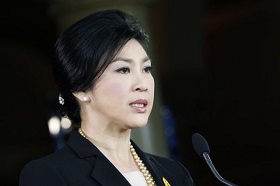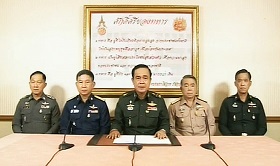The legality of introducing martial law in Thailand is questioned both inside and outside the country. The United States has announced that it would be suspending military aid to Thailand, one of the key “non-NATO” partners. It is unclear what the aftermath of the army’s actions will be. What is clear is that in the medium term Thailand will see an economic rollback and continue to be at a political crossroads when the old system of checks and balances no longer works, but is fiercely resisting change.
The situation in Thailand has been tense since November 2013, when the opposition, led by the Chairman of the Democrat Party Suthep Thaugsuban, launched rallies in Bankkok in protest against attempts by former Prime Minister Yingluck Shinawatra to get an amnesty bill through parliament. If passed, the bill would have allowed Yingluck’s brother and former Prime Minister Thaksin Shinawatra, whose removal from power in 2006 divided the country and plunged it into successive cycles of instability, to return to the country.
However, the government and the opposition were not the only players in this process. The army and the Constitutional Court were frequently involved in the confrontation. Shinawatra was toppled in a military coup. In 2008 Shinawatra’s men, Samak Sundaravej and Somchai Wongsawat, were deposed as prime ministers by decision of the Constitutional Court. This time around, however, the judges and the military kept neutrality for almost half a year and did not seem inclined to interfere.
However, in early May, the Constitutional Court ruled to remove Yingluck Shinawatra for abuse of office. In 2011, she sacked the Council for National Security Secretary Thawil Pliensri. The Court was of the opinion that she and her Pheu Thai Party would have benefited from the reshuffle. Two weeks after the court ruling, the army imposed martial law, arrested Yingluck Shinawatra and some government officials, dissolved the Senate, and introduced a curfew and restrictions on TV broadcasting. But the military claimed that what was happening was not a military coup.
It looks as if the army is indeed not the main political player in this case. The situation in Southeast Asia does not favour a return to direct military rule in one of the most dynamic economies in the region, which in the late 1990s also set what seemed to be successful example of democratization. That is why the army’s involvement in the political process was most probably instrumental. Its aim is to clear the political field of any figures that could be associated with Thaksin Shinnawatra, and apparently of the opposition leaders who discredited themselves with their overly aggressive actions during the civil unrest. It is more likely that the driving forces at the moment are the so-called traditionalists, representatives of the old political elite and the Privy Council. From the late 1990s, they controlled the decision making in the country with reasonable success while not being formally part of the political system. This state of affairs was upset by Thaksin Shinnawatra’s intervention. His populist policy that attracted large sections of the population with the promise of a better life and the rapid strengthening of Shinnawatra placed the established system in jeopardy and seriously shook the positions of the traditionalists.
In fact, it was the democratization of the political system after the adoption of the 1997 Constitution that gave people who had previously been denied access to the political process and were at best able to transmit their interests by proxy the opportunity to play an active role in the political life of the country. It soon became clear, however, that the real democratic mechanisms were not coping with the political change and that the traditional elements linked with the Privy Council, the army and the judges were still active. The past six months of civil confrontation have shown that the political forces in Thailand are by no means ready to play only by democratic rules, even though popular participation in the political process was increasing and a significant segment of the population disapproved of undemocratic ways out of the political crisis. The introduction of martial law in May of this year left no doubt that informal elements within the political process had prevailed over the constitutional norms.
The army’s actions do not seem to promise a quick solution to all the problems, although it probably did step in with that very intention. The current situation is more complicated than in 2006, and simply removing Thaksin Shinnawatra’s supporters from power is unlikely to save Thailand from the need for a national dialogue and political reform. Over the past decade, a large segment of the electorate has emerged that votes solidly for Thaksin Shinnawatra or his protégés. And the turmoil of recent years shows that the interests of that constituency can no longer be ignored. What is more, it is likely that the Pheu Thai Party is regrouping and casting about for people who can continue to represent the party in the political process.
The legality of introducing martial law in Thailand is questioned both inside and outside the country. The United States has announced that it would be suspending military aid to Thailand, one of the key “non-NATO” partners. It is unclear what the aftermath of the army’s actions will be. What is clear is that in the medium term Thailand will see an economic rollback and continue to be at a political crossroads when the old system of checks and balances no longer works, but is fiercely resisting change. Thus, the space for a comprehensive compromise within the nation is reduced even more.






